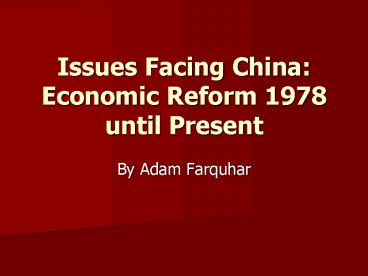Issues Facing China: Economic Reform 1978 until Present - PowerPoint PPT Presentation
1 / 20
Title:
Issues Facing China: Economic Reform 1978 until Present
Description:
They were divided into 3 categories: the Unemployed, the Xiagang, and the Newly Indigent ... Newly Indigent. This was the name given to the urban poor who were ... – PowerPoint PPT presentation
Number of Views:70
Avg rating:3.0/5.0
Title: Issues Facing China: Economic Reform 1978 until Present
1
Issues Facing China Economic Reform 1978 until
Present
- By Adam Farquhar
2
(No Transcript)
3
Points of Discussion
- Decentralization
- Government policies towards urban and rural
workers - Public opinion of Chinese Citizens
4
A Brief History
- After 1919, there was a power vacuum
- The Treaty of Versailles was signed, giving land
back to Japan. - Chiang Kai-shek took over much of the South.
- A brutal war ensued between Mao Zedong and Chiang
Kai-shek.
5
Government Structure
- The top level of Government is organized under
the Politburo. - Jobs are divided up within the Politburo.
- 1. Preeminent Leader
- 2. Elders
- 3. Generalists
- 4. Functional Specialists
6
Deng Xiaoping
7
Decentralization
- The death of Mao Zedong brought about the rise of
Deng Xiaoping in 1978. - He began the process of Decentralization.
- Eating in Separate Kitchens
8
Decentralization (cont.)
- A strong central government is more capable of
meeting basic needs of people. - The Government does step in when needed.
- The political factor is not given enough weight.
9
Deng Xiaoping and the Rural Workforce
- Initially, the peasant framers loved Deng
Xiaoping. - This changed when the CPC Central Committee
passed Chinas Economic Structure Reform. - Rural farmers were left with a surplus of output.
10
Jiang Zemin
11
Deng Xiaoping and Jiang Zemins Policies Towards
the Urban Unemployed
- Unemployment was originally unheard of.
- The Government had to compensate for workers
effected by the economic transition. - They were divided into 3 categories the
Unemployed, the Xiagang, and the Newly Indigent
12
Unemployed
- Workers started being hired only on limited term
contracts. - One percent of wages had o go to an unemployment
fund. - Unemployment insurance could only go to state
enterprise workers.
13
Xiagang
- This term refers to workers who were no longer
needed but still associated with their firm. - Workers were retrained in this program, then
redistributed. - Program was scrapped in 2001.
14
Newly Indigent
- This was the name given to the urban poor who
were unable to get a job. - In this plan ties were severed with their former
employer and they were given assistance. - People who worked for firms not directly owned by
cities were not receiving the aid.
15
The Chinese People
16
Public Opinion
- Collecting reliable public opinion data is not
impossible in China. - Average citizens were more willing to share their
views than the wealthy and politically connected. - Results were published in Public Opinion and
political Change in China, by Wenfang Tang.
17
Public Opinion (Positive)
- Highest rated aspect of life was family life and
social life. - Two-thirds of people interviewed were also happy
with their freedom of speech. - The peoples understanding of freedom of speech
did not have to do with government structure.
18
Public Opinion (Negative)
- The two biggest problems the average person had
with reform was with the environment and crime
control. - A little over half of people surveyed were
disappointed with their job prospects. - People were divided over the issue of housing.
19
Conclusion
- China is growing at a rapid pace.
- The country is still in a stage of
self-discovery. - There are some pressing issues that if not
addressed could cause major problems for China. - Improving government structure and resilience on
the part of the Chinese citizens make Chinas
outlook seem more hopeful than not.
20
The End































